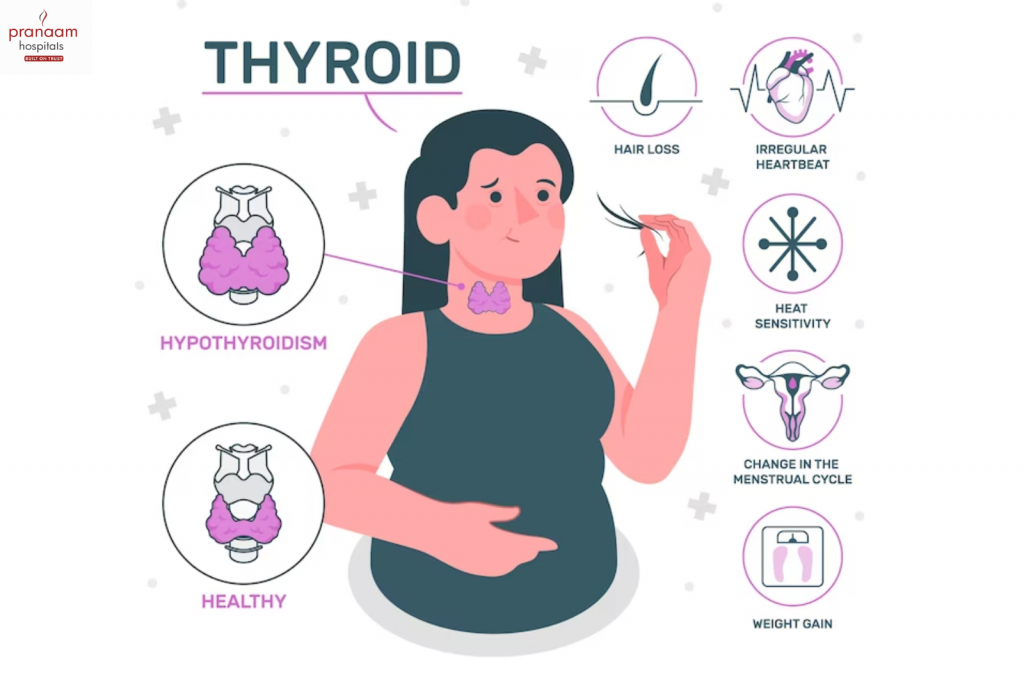Hypothyroidism: The thyroid gland, a butterfly-formed powerhouse for your neck, plays a crucial position in regulating your metabolism, influencing everything out of your energy tiers on your temper. When this vital engine sputters and slows down, a circumstance known as hypothyroidism arises.
Symptoms: Hypothyroidism’s signs regularly creep in progressively..
Fatigue: Even after a good night’s rest, do you feel exhausted all the time? This is a classic sign.
Weight gain: If you have gained weight but haven’t overindulged, this could be a warning indication.
Sensitivity to cold: Are you constantly cold, even in situations when others seem comfortable? It’s possible that your metabolism is poor.
Dry skin and hair: Your hair gets brittle and dry, and your skin may feel rough and scaly.
Brain fog: memory loss, difficulty focusing, and forgetfulness may indicate hypothyroidism.
Mood swings: An imbalance in thyroid hormones has been related to anxiety, anger, and depression.
Additional symptoms include constipation, irregular menstruation cycles, joint discomfort, soreness in the muscles, and hoarse voice.
Hypothyroidism can be caused by various factors, including:
Autoimmune attack: Your immune system misattacks your thyroid gland, preventing it from producing hormones, which results in Hashimoto’s thyroiditis.
Iodine insufficiency: With iodized salt, a deficiency in iodine, which is required for the generation of thyroid hormone, is rarer now than it was in the past.
Side effects of thyroid treatment: Radiation therapy or medication for hyperthyroidism (overactive thyroid) can occasionally harm the thyroid and cause hypothyroidism.
Surgery on the thyroid: Hormone shortage may result from thyroid gland removal, either completely or partially.
The pituitary gland’s issues: The pituitary gland regulates the thyroid. Issues pertaining to this gland may impact the generation of thyroid hormones.
Foods to Avoid:
Diet factors are important for people with hypothyroidism in order to support thyroid function and successfully manage symptoms. Although there’s no one-size-fits-all method, the following are broad recommendations on foods that people with hypothyroidism should limit or stay away from:
Soy Products: Iodine absorption is inhibited by goitrogens, which are chemicals found in soy that can interfere with thyroid function. This may further reduce the synthesis of thyroid hormones. It can be wise to restrict your intake of soy-based items like tofu and soy milk.
Cruciferous Vegetables: Gorgongens are also present in vegetables such as cauliflower, broccoli, cabbage, and Brussels sprouts. It’s best to consume these veggies in moderation, especially if they make up a large portion of the diet, even though cooking them can help lessen their goitrogenic effect.
Processed Foods: Eating a lot of processed food, especially when it contains harmful fats, carbohydrates, and chemical additives, can lead to inflammation and have a bad effect on thyroid function. Instead, choose complete, nutrient-dense foods.
Foods containing gluten: Cutting back or avoiding gluten consumption may be beneficial for certain individuals with hypothyroidism, as there may be a correlation between autoimmune thyroid problems and gluten sensitivity. Grain consumption, including wheat, barley, and rye, should be done so cautiously.
Dairy Products: Studies suggest that lactose intolerance and autoimmune thyroid problems may be related. If lactose sensitivity is an issue, consider lactose-free or plant-based milk alternatives.
Iodine Overdosage: Iodine is essential for thyroid function, but too much of it can be dangerous, especially for those with hypothyroidism. Consume as little iodine-rich food as you can, such as iodized salt and seaweed, unless your doctor tells you differently.
Processed Meats: Items like hot dogs and sausages sometimes contain chemicals and preservatives that might exacerbate inflammation. Pick lean, unprocessed protein sources like fish, poultry, and legumes.
Caffeine and Alcohol: Excessive consumption of alcohol and caffeine can impact thyroid function and exacerbate symptoms such as anxiety and insomnia. To stay hydrated, it’s critical to exercise moderation and consume adequate water.
Each person’s needs are unique. For individualised nutritional guidance based on your particular illness and medication schedule, speak with your physician or a qualified dietitian.
Balance and moderation are essential. Even if they are on this list, most foods can still be eaten in moderation as part of a balanced diet.
To support your general health and well-being, put your attention on eating foods high in nutrients, such as fruits, vegetables, whole grains, lean protein, and healthy fats.
Also Read: Symptoms and Causes of Appendicitis
Understanding about Kidney Stone Formation and Guidelines for Diet


